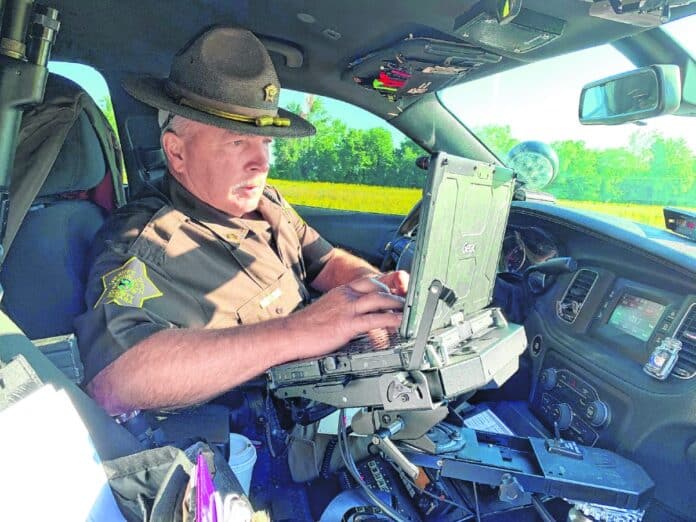
Bartholomew County Sheriff deputies and Columbus police officers are in the midst of Operation Pullover patrols, a targeted traffic enforcement mobilization looking for motorists who are speeding, running red lights, distracted driving and other infractions, such as not wearing a seat belt.
And officers are finding some success.
On Thursday, Bartholomew County Sheriff’s Department Capt. Dave Steinkoenig pulled over 24 vehicles in one shift on County Road 325W, which is a common back-way being used by many west-side residents to get to the National Road area via Lowell Road.
Steinkoenig, in an unmarked vehicle, was stopping vehicles quickly after finishing each traffic pullover around the lunch hour, at times turning his car around after determining an oncoming car was way over the posted 50 mph speed limit.
The majority of Steinkoenig’s stops were for speeding violations, said Chief Deputy Maj. Chris Lane, adding that he doubted that the captain gave too many speeding tickets. “He probably gave warnings,” Lane said.
County Road 325W, which is a straight, narrow county road from State Road 46 until it gets into some curves near Lowell Road, is a common place that people tend to ignore the initial 50 mph speed limit, which goes to 45 mph at the curves, Lane said.
“From (State Road) 46 to Georgetown (Road), it’s a pretty straight stretch for the heavy foots,” Lane said. “It’s a narrow road, and if you can get off the side of the road there, there is no wide shoulder.”
In an earlier Operation Pullover this year that lasted for 24 days, the sheriff’s department and CPD issued 338 traffic citations and made 17 arrests for impaired and aggressive driving enforcement in Bartholomew County, according to the sheriff’s department.
Columbus police are also doing Operation Pullover enforcement, focusing on speeding complaints from the Washington Street area and Second and Third streets, which continue through the downtown area, said Lt. Matt Harris, Columbus Police Department.
Speeding enforcement is always underway throughout the entire city as officers are assigned to patrol different areas of Columbus, Harris said.
Sheriff Matt Myers said the most common reason for traffic stops on county roads is speeding.
“The accidents we see on county roads are by far worse than anything I ever saw in the city as a city police officer,” he said.
Speeding is dangerous on County Road 325W, and many other county roads, as there is often very little shoulder on the side of the road, and if a driver drops off the side of the pavement and over-corrects, their vehicle will either veer into oncoming traffic or possibly flip, Myers said.
While current staffing levels do not allow deputies to often conduct targeted traffic enforcement, Myers said Operation Pullover offers federal money for overtime, providing an opportunity to zone in on areas reported as trouble spots.
In 2018, Myers said deputies conducted 21% more traffic stops than the previous year, and much of that is due to a targeted effort to find drug dealers transporting drugs into the county from Indianapolis, Ohio or Kentucky.
“These people who are doing this (transporting drugs) are driving broke-down cars, no proper registration, they are speeding, not wearing seat belts,” Myers said. “They just don’t get it. The last Operation Pullover, we stopped 40 cars in two days.”
The Operation Pullover traffic enforcement, which is done by paid overtime, is funded through National Highway Traffic Safety Administration grants administered by the Indiana Criminal Justice Institute.
Among the logos used for the enforcement are signs that say “Obey the Sign or Pay the Fine,” and “Drive Sober or Get Pulled Over.”
Myers said the Operation Pullover efforts are not about taking money out of people’s pockets by writing tickets, and said deputies do not have any ticket quotas.
“Our goal is to change behavior,” he said. “If we can pull you over and have a little talk about speeding, we are trying to keep bad things from happening. But if writing tickets is what it takes to get the message across, then we will do it.”




